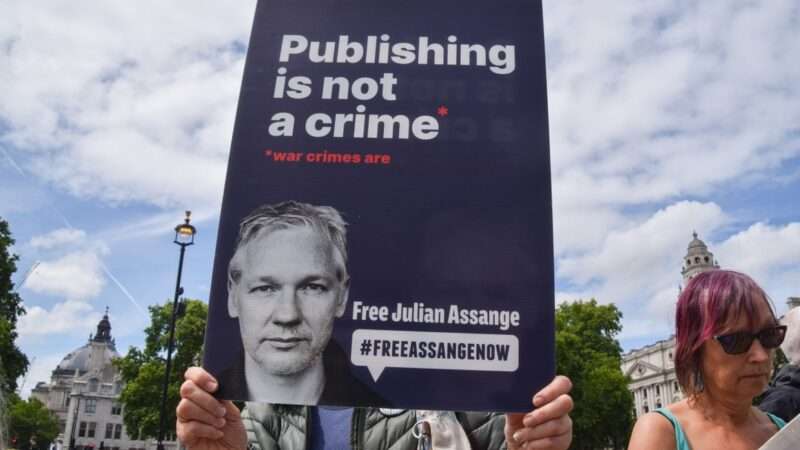
Three members of Congress are attempting to avoid future Julian Assange–style prosecutions by amending the U.S. espionage law so that it doesn’t apply to journalists.
Last week, Sen. Ron Wyden (D–Ore.) and Reps. Ro Khanna (D–Calif.) and Thomas Massie (R–Ky.) partnered up to reintroduce the Espionage Act Reform Act. The Espionage Act, passed in 1917, is ostensibly intended to punish and imprison government employees and contractors for providing or selling state secrets to enemy governments. In practice, the law has been brought to bear time and time again to attempt to punish journalists and whistleblowers for attempting to inform the public about serious issues the U.S. government would prefer to keep secret. While people like Pentagon Papers whistleblower Daniel Ellsberg, Iraq War leaker Chelsea Manning, domestic surveillance whistleblower Edward Snowden, drone whistleblower Daniel Hale, and WikiLeaks founder Julian Assange aren’t spies of foreign governments, many have been threatened with or thrown into prison as if they were.
The Espionage Act Reform Act would change the law in a couple of ways. First of all, the reform would clarify that the espionage law specifically affects people authorized to receive confidential government information (federal employees or contractors), meaning that journalists who receive classified information and publish it are not engaging in espionage. It also establishes that whistleblowers within the government are able to turn to members of Congress, federal courts, an inspector general, and a couple of other key oversight agencies with important classified information without running afoul of the law.
In short, the goal is to align the law with what people think that the law is for—to punish spies, not people trying to warn lawmakers or the public about federal government misconduct.
“At a time when government officials claim the right to perform warrantless surveillance upon all American citizens, there is an urgent need to zealously guard freedom of the press and to demand government transparency and accountability,” Massie said in a prepared statement. “The ongoing attempts to prosecute journalists like Julian Assange under the Espionage Act threaten our First Amendment rights, and should be opposed by all who wish to safeguard our constitutional rights now and in the years to come.”
Assange still currently faces extradition from the U.K. to the United States, where he faces 18 separate espionage-related charges for publishing the documents provided by Manning. Media watchdogs and human rights groups have been warning that the prosecution of Assange serves as a threat to journalism and compromises free speech.
The Knight First Amendment Institute supports the bill and sent out a statement urging for better safeguards for those who report on important national security issues.
“We welcome this bill, which would provide important new protection for press freedom in the United States,” said Carrie DeCell, senior staff attorney for the Institute. “It would provide crucial safeguards for national-security journalists, enabling them to report on issues of indisputable interest to the public without fear of criminal liability. Congress should enact this bill and also provide additional protections to national-security whistleblowers.”
Khanna and Wyden first introduced the bill in 2020. Each of them was referred to their respective House and Senate Judiciary Committees, where they sat with no further action.
The post Proposed Bill Would Protect Journalists Like Julian Assange From Espionage Charges appeared first on Reason.com.
from Latest https://ift.tt/m5aX79C
via IFTTT